In today’s fast-paced digital landscape, incorporating artificial intelligence (AI) into your digital marketing strategy can provide a competitive edge. AI tools have revolutionized the way marketers analyze data, automate processes, personalize customer experiences, and optimize campaigns. In this article, we will explore the ten best AI tools for digital marketing, highlighting their features, benefits, and potential drawbacks.
1. Acquisio
Acquisio is a powerful AI-driven advertising platform that enables marketers to optimize their digital advertising campaigns across multiple channels, including search, display, and social media. Its intelligent algorithms analyze vast amounts of data to make data-driven decisions, leading to improved campaign performance and increased ROI.
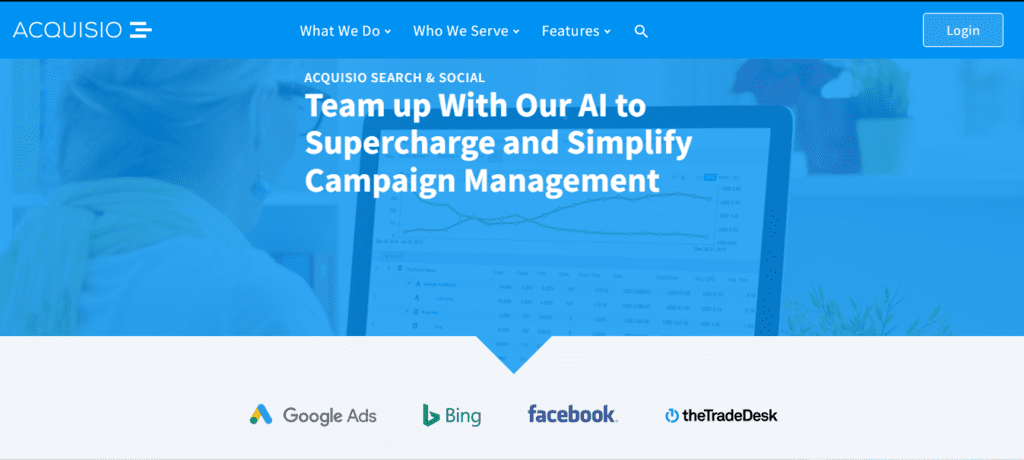
Pros:
- Advanced optimization capabilities.
- Cross-channel integration for holistic campaign management.
- Granular performance tracking and reporting.
- Real-time bidding for efficient ad spend allocation.
Cons:
- Steep learning curve for beginners.
- Limited support for certain advertising platforms.
Official Website: Acquisio
2. Albert
Albert is an AI marketing platform that leverages machine learning and predictive analytics to automate and optimize digital marketing campaigns. By autonomously testing, targeting, and executing campaigns, Albert helps marketers achieve better results while saving time and resources.
Pros:
- Autonomous campaign execution.
- Advanced targeting and personalization capabilities.
- Continuous optimization based on real-time data.
- Seamless integration with existing marketing tools.
Cons:
- High pricing, making it suitable for larger enterprises.
- Limited support for smaller advertising channels.
Official Website: Albert
3. Phrasee
Phrasee is an AI-powered copywriting tool specifically designed for creating compelling email subject lines, social media posts, and ad copy. By analyzing vast amounts of data, including past performance and audience preferences, Phrasee generates engaging and persuasive content that resonates with customers.
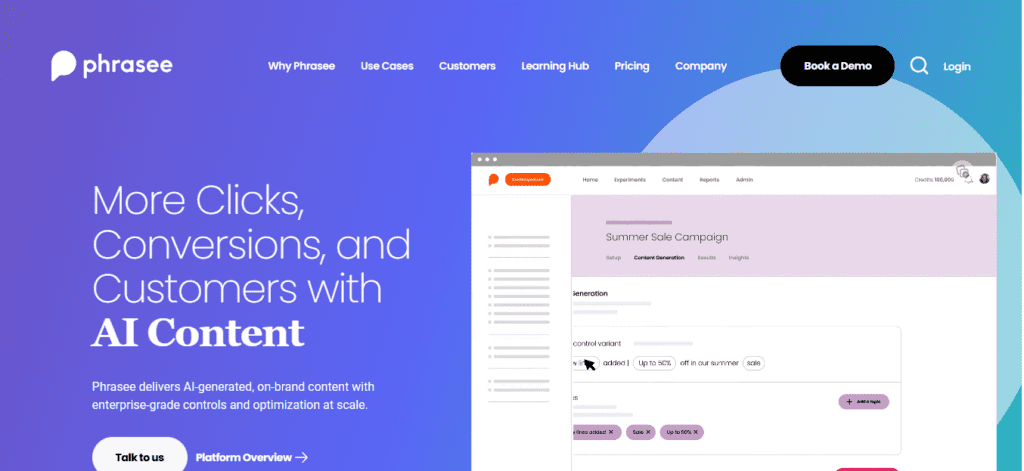
Pros:
- Improved engagement and click-through rates.
- A/B testing functionality for performance optimization.
- Language and tone adaptability for diverse audiences.
- Integration with popular marketing automation platforms.
Cons:
- Limited language support for non-English content.
- Reliance on historical data for performance predictions.
Official Website: Phrasee
4. Emarsys
Emarsys is an AI-powered marketing automation platform that enables marketers to deliver personalized, data-driven experiences across various channels, including email, mobile, and social media. By leveraging AI algorithms, Emarsys helps marketers segment their audience, automate campaigns, and optimize customer journeys.
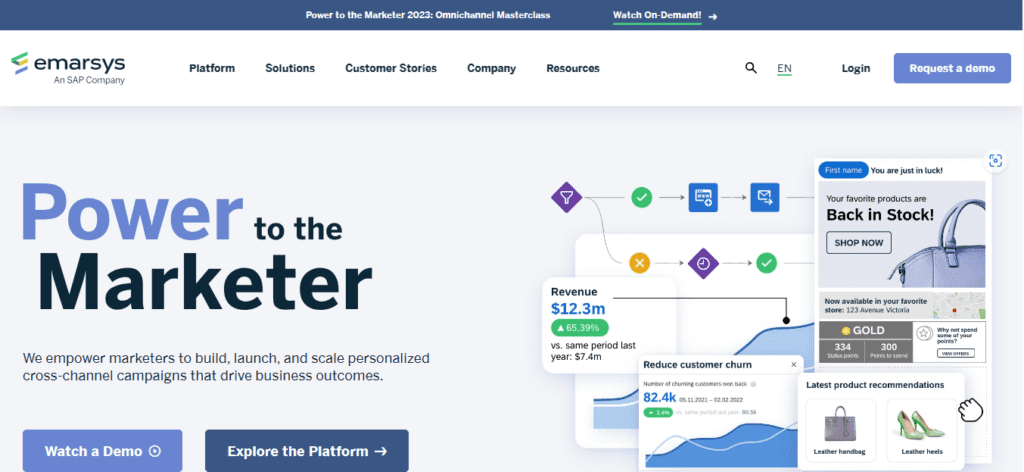
Pros:
- Advanced segmentation and targeting capabilities.
- Real-time personalization for improved customer experiences.
- Multichannel campaign orchestration.
- Predictive analytics for forecasting and planning.
Cons:
- Complex implementation and onboarding process.
- Limited support for certain CRM platforms.
Official Website: Emarsys
5. IBM Watson
IBM Watson is a renowned AI platform that offers a wide range of AI-powered solutions for digital marketing. From chatbots and virtual assistants to sentiment analysis and predictive analytics, IBM Watson empowers marketers with tools to enhance customer interactions, understand market trends, and optimize marketing campaigns.
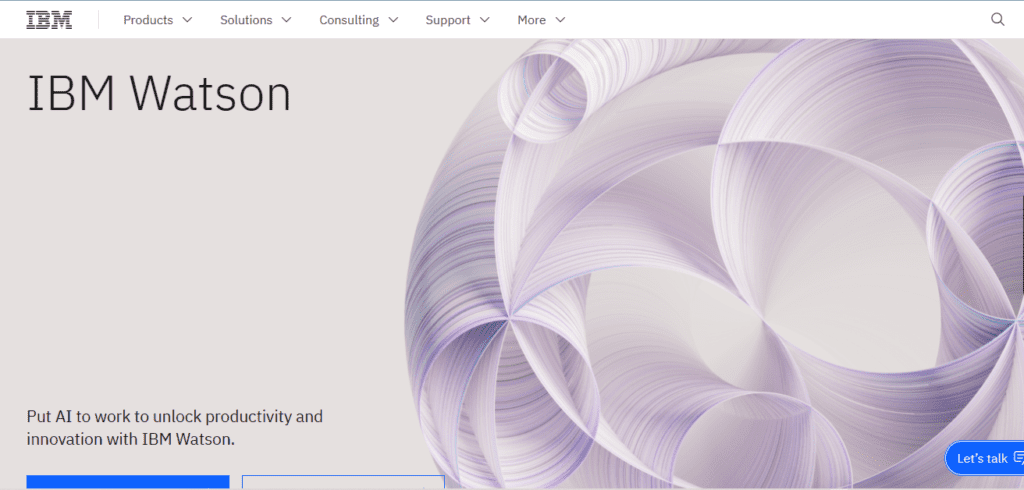
Pros:
- Versatile AI capabilities for various marketing applications.
- Advanced natural language processing and sentiment analysis.
- Deep insights and actionable recommendations.
- Extensive documentation and support resources.
Cons:
- High pricing, mainly suitable for large enterprises.
- Requires technical expertise for implementation.
Official Website: IBM Watson
6. Adobe Sensei
Adobe Sensei is an AI framework embedded in Adobe’s digital experience platform, which powers their suite of marketing and creative tools. By harnessing AI, Adobe Sensei enables marketers to automate tasks, personalize experiences, and gain valuable insights from data, contributing to more impactful marketing strategies.
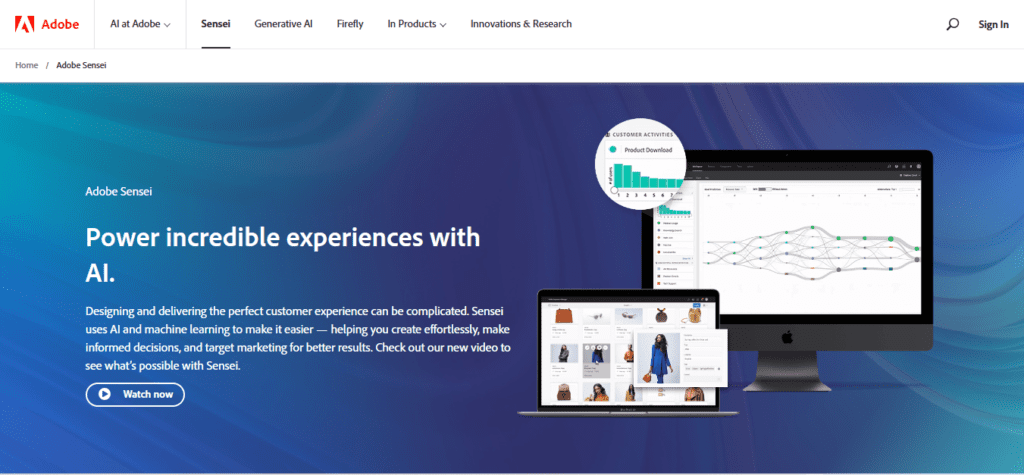
Pros:
- Seamless integration with Adobe’s creative and marketing tools.
- Automated content creation and personalized recommendations.
- Intelligent segmentation and audience profiling.
- Advanced image and video analysis capabilities.
Cons:
- Pricing may be prohibitive for smaller businesses.
- Some features limited to Adobe’s ecosystem.
Official Website: Adobe Sensei
7. Google Analytics
Google Analytics, although not exclusively an AI tool, incorporates AI features that provide marketers with deep insights into website traffic, user behavior, and campaign performance. By leveraging machine learning algorithms, Google Analytics offers valuable recommendations and predictive insights for data-driven decision-making.
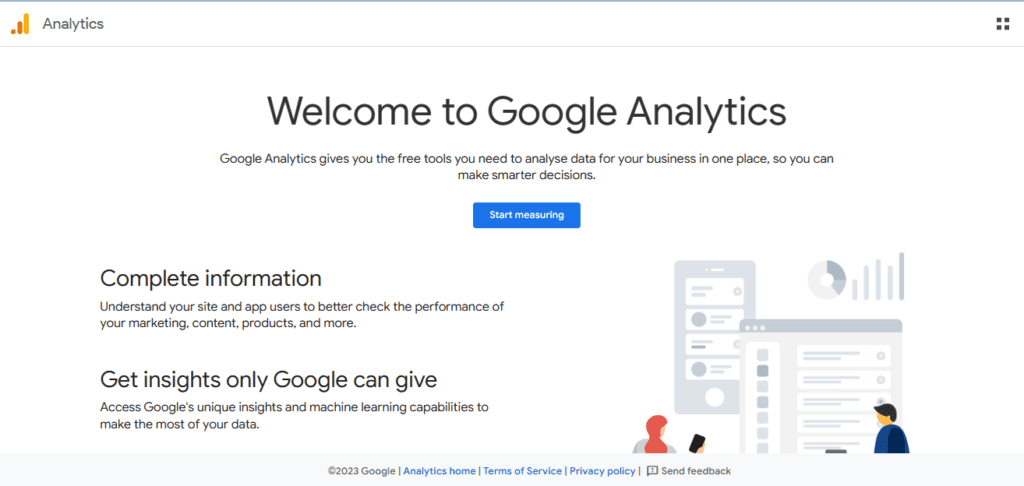
Pros:
- Comprehensive web analytics capabilities.
- Integration with other Google marketing tools.
- Intelligent insights and performance predictions.
- Free version available with powerful features.
Cons:
- Steep learning curve for beginners.
- Overwhelming amount of data and features.
Official Website: Google Analytics
8. HubSpot
HubSpot, a leading marketing automation platform, employs AI to help businesses attract, engage, and delight customers throughout their journey. With AI-powered features such as lead scoring, content optimization, and chatbots, HubSpot streamlines marketing efforts and improves customer interactions.
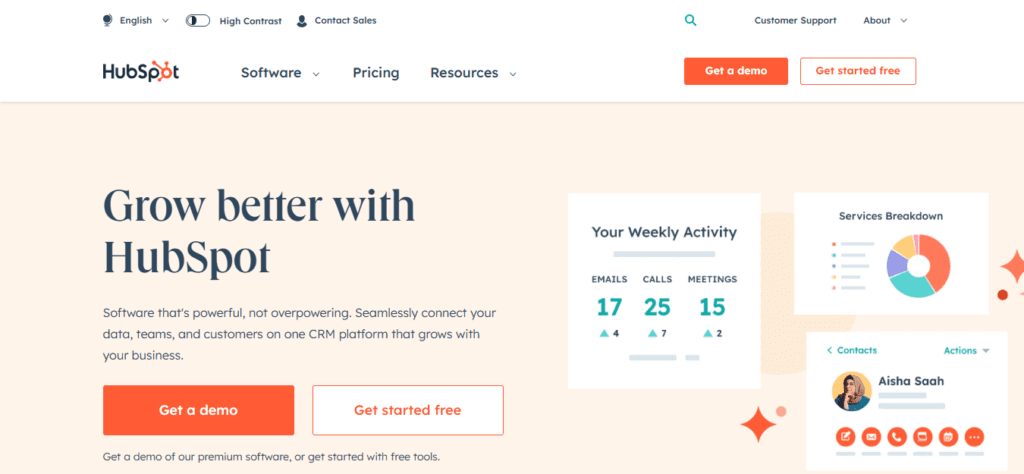
Pros:
- All-in-one marketing automation platform.
- Intuitive user interface and easy implementation.
- Powerful lead nurturing and scoring capabilities.
- Integration with popular CRM systems.
Cons:
- Higher pricing tiers for advanced AI features.
- Limited customization options for certain features.
Official Website: HubSpot
9. Salesforce Einstein
Salesforce Einstein is an AI-powered CRM platform that assists marketers in understanding and engaging with their customers. By leveraging AI algorithms, Einstein offers predictive lead scoring, personalized recommendations, and intelligent customer segmentation, helping marketers enhance their targeting and conversion efforts.
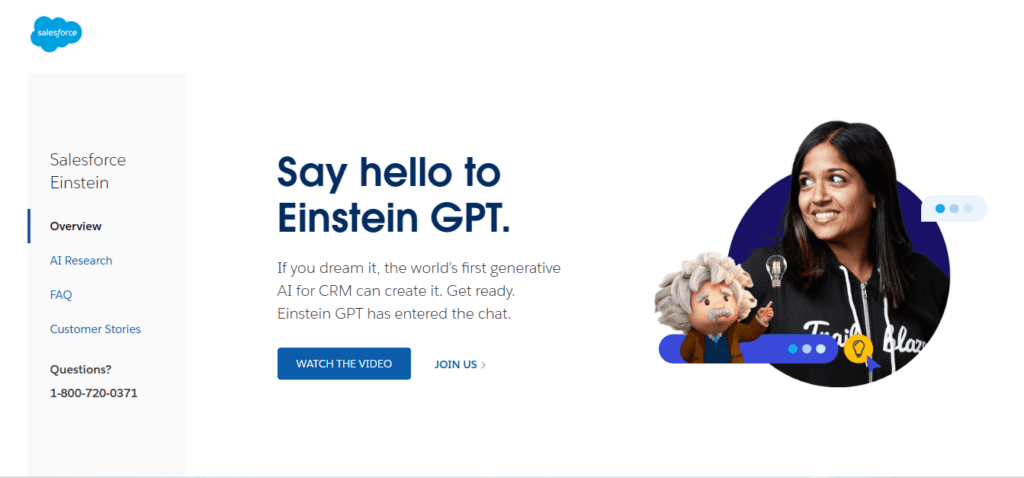
Pros:
- Deep integration with Salesforce CRM.
- Predictive insights and recommendations.
- Automated data analysis and reporting.
- Customizable AI models for tailored solutions.
Cons:
- Requires Salesforce CRM for full functionality.
- Steep learning curve for complex AI features.
Official Website: Salesforce Einstein
10. Optimizely
Optimizely is an AI-driven experimentation platform that enables marketers to optimize website experiences, user journeys, and digital campaigns. By employing AI algorithms and A/B testing, Optimizely helps marketers identify the most effective variations, improving conversion rates and overall customer satisfaction.
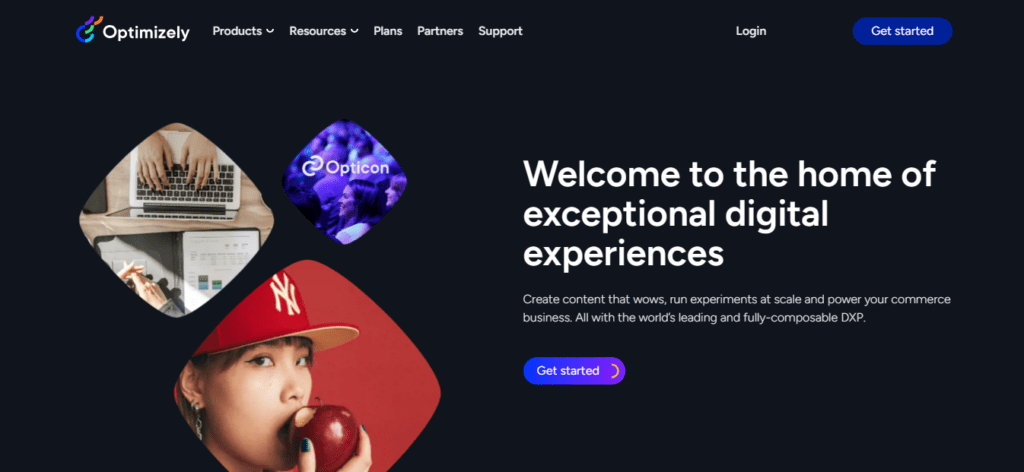
Pros:
- Intuitive visual editor for easy experimentation setup.
- Advanced statistical analysis and recommendations.
- Multichannel optimization capabilities.
- Integration with popular marketing and analytics tools.
Cons:
- Higher pricing for advanced features.
- Limited support for certain platforms and technologies.
Official Website: Optimizely
Conclusion
Incorporating AI tools into your digital marketing strategy can unlock a wealth of opportunities for improved targeting, personalization, automation, and optimization. By leveraging the power of AI, marketers can enhance their campaigns, deliver exceptional customer experiences, and stay ahead in the ever-evolving digital landscape.
Please note that the information provided about the AI tools is based on their features and capabilities up to my knowledge. It is advisable to visit the official websites of the tools for the most up-to-date information.

